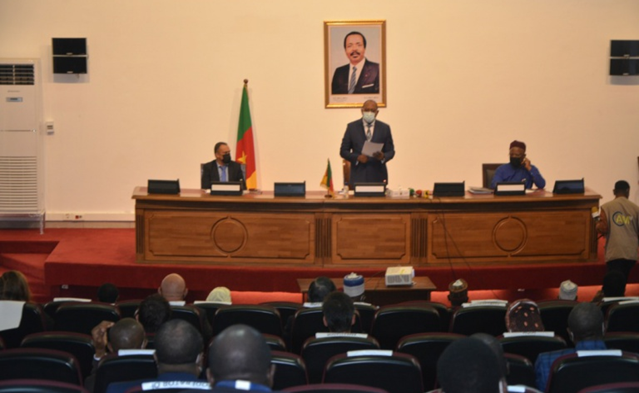By Doh Bertrand Nua
The implementation of the Presidential Plan for Reconstruction and Development of Cameroon’s conflict-hit North West and South West regions has disclosed there are huge challenges faced securing funding from international partners.
Chairing the session which brought together members of the diplomatic corps and international organisations, the Director of Cabinet at the Prime Minister’s Office who doubles as chairperson of the reconstruction Steering Committee, Balungeli Confiance Ebune, revealed that the plan was facing hurdles due to stalled mobilisation of funds.
He said out of the estimated budget of 89 billion FCFA, a meagre 12% FCFA only has been mobilised.
“The main constraints of the past year have been the lack of financial resources. Out of an estimated budget of 89 billion, only 10.4 billion FCFA could be mobilised” Balungeli said.
The implementing partner of the plan, United Nations Development Programme, UNDP, it was said had contributed 1.5 billion FCFA while the Japanese government has granted nearly 1.5 billion FCFA.
The official said the plan which is entering its second year of implementation has fought to promote social cohesion, rehabilitation of schools and health facilities belonging to churches.
Speaking at the end of the session, the National Coordinator of the reconstruction plan, Minister Paul Tasong, explained that trends show a net improvement of socio-economic welfare of the two restive regions since 2020. The improvement, the coordinator stated, is based on a study carried out by the committee.
“In 2016, the South West exported 136,000 tonnes of banana but in 2019, this same region barely exported 16,000 tonnes and this was mainly from the Boh Banana plantation but on the contrary, the agro-industrial giant, the CDC did not export a single tonne that year,” Tassong told reporters.
He added that: “As from 2020, the CDC started recovering its banana production. By the end of the first semester of 2021, the CDC had exported 12,000 tonnes of Banana. This is an indication of an improving environment for this sector”.
In terms of revenue generation, the Coordinator explained, “the Customs and Taxation generated 24 billion in 2016 but in 2019, these two department recovered only 14 billion. In 2020 we noted a perceptible improvement for the two regions”.
With about 1.1 million school enrolment in the two regions before the start of the crisis in 2016, the figures reportedly dropped 225,000 enrolment in 2019. He said there was an increase in school attendance in the 2020/2021 school year of 427,000 pupils and students.
Giving that life is gradually returning to the affected regions, despite some isolated cases of sporadic attacks and destruction of property, Paul Tassong urged Cameroon’s development partners to match words with action by contributing financially to sponsor the plan. This to him, will be a testimony to their declarations and support for a united Cameroon.
“Our most important challenge of the recovery phase of the presidential plan is funding. We are lagging behind while our needs continue to explode. We are very aware of the goodwill demonstrated by some of our partners with Japan leading the chart…” he declared adding that “the financial contribution of our partners consolidate what some of them have already declared as position in the crisis”.
The views and opinions expressed in this article are those of the authors and do not necessarily reflect those of Africanian News.
